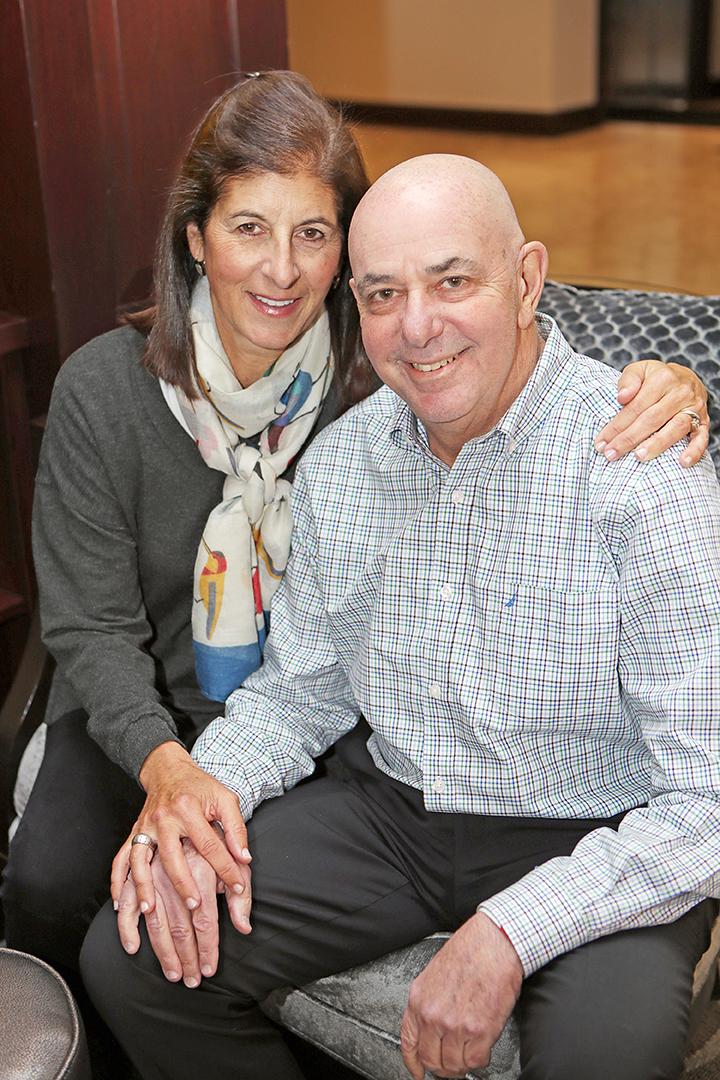David Matasar will celebrate his 65th birthday on Oct. 17, 2018, but he will tell you his life started over in 2017. The day after his October birthday he will be marking Year One since his stem cell transplant, part of his treatment for mantle cell lymphona cancer. Doctors “consider that Day Zero or your re-birth,” Matasar said.
David Matasar will celebrate his 65th birthday on Oct. 17, 2018, but he will tell you his life started over in 2017.
The day after his October birthday he will be marking Year One since his stem cell transplant, part of his treatment for mantle cell lymphona cancer.
Doctors “consider that Day Zero or your re-birth,” Matasar said.
and his wife, Lori, say he
received exceptional care
at Ingalls and UChicago
Medicine as a stem cell
transplant patient. (Provided
photo)
Following chemotherapy, a stem cell transplant allows doctors to fill the blood system with bone marrow cells, the primary site of new blood cell reproduction. The marrow cells are harvested and reintroduced into the body to resume making healthy cells to rid the body of the impurities that were enabling cancer cells to multiply.
In Matasar’s case, the stem cell transplant worked.
The journey to a clean PET scan was long and arduous, but Matasar, an avid golfer and tennis player in good health, was a perfect candidate for the procedure.
The Homewood resident discovered a growth near his groin. Within days he’d had tests that verified the mass was Stage 2 cancer and it was spreading in his abdominal area. He consulted with his friend Dr. Mark Kozloff, a noted cancer specialist and researcher at UChicago Medicine Ingalls Memorial, on what to do next.
“At this point it’s sort of a whirlwind. I did all the reading I could. I had a thousand questions and the doctor was very calm,” he remembers.
At a consultation in April 2017, Kozloff gave him two options. Matasar chose the more aggressive stem cell transplant option.
His calendar was overtaken with appointments, tests and a schedule that included six rounds of chemotherapy delivered three weeks apart. The chemo “cocktail” included four medications and Rituxin to attack the lymphoma cells.
In good health and good spirits, Matasar got the first three treatments at Ingalls Memorial and got updates on his condition from Kozloff who was consulting with Dr. Justin Kline, a mantle cell specialist at UChicago Medicine. In time, Kline would become Matasar’s primary doctor. The partnership between Ingalls Memorial and UChicago Medicine made the care between hospitals seamless.
“You can feel lost dealing with a hospital but they were with us every step of the way,” Matasar’s wife, Lori, said.
Matasar continued to work as a branch manager for HP Products, and didn’t complain of any serious side effects. His plan was to get his second set of three treatments at UChicago Medicine as an outpatient.
Treatment 4 delivered a new “cocktail” but he had no side effects. Treatment 5 affected his kidneys. Renal specialists were added to the doctor team. After a week, his kidney function numbers looked good and he went home and got additional iron and magnesium supplements at Ingalls Memorial.
A PET scan showed he was clear of cancer so the sixth chemotherapy treatment was dropped and the countdown to a stem cell transplant started.
Matasar was admitted to UChicago Medicine in late September and underwent the all day blood draw process. The harvested blood is kept frozen until stem cell transplant day.
On Oct. 11, he was admitted to the oncology ward with a countdown of six days until the transplant procedure on Oct. 17. But first, he would undergo six straight days of additional chemotherapy.
Matasar said in his mind he was ready. And then he saw his nurse pause. She called in a doctor who diagnosed Matasar had A-Fib, an irregular heartbeat.
“I was ready. I wanted to get on with it. This glitch didn’t make me happy,” he remembers. It set him back one day. The countdown started anew.
The treatments were intense. He passed out. He got terrible mouth sores. He lost his appetite. The support from family and friends helped him manage through those rough days.
“His walls were plastered with photos of friends and family. And he could have visitors, so our sons and friends were with him,” Lori said.
Regarding Day Zero, Matasar explained “it’s your re-birth.”
“Your system’s been completely rebooted. I have no platelets, no white blood cells, no ability to fight off disease. My immune system is really brought down to zero,” he said.
On transplant day, a team of doctors and nurses had four bags of Matasar’s frozen blood to thaw. He’s administered an antihistamine and starts to get drowsy. Then he’s out.
“I wake up and I say ‘Let’s go!’ and the doctor says ‘It’s over.’ I’ve been waiting months to get my stem cells and I slept through the whole thing,” he says with a smile.
The next several days he remembers as “rock bottom,” but his stem cells began to kick in, his blood work showed improvement and he gradually felt better. After three weeks, Matasar was discharged and for the next several months Lori served as his caregiver administering various medicines and checking his vitals.
He was able to return to work in early January. Today he is under the care of Kozloff at Ingalls Memorial. His PET scan in March showed he was in full remission. He’s back to playing tennis.
Next is a series of shots around his birthday. That may seem a strange gift for a 65-year-old, but it will be one more step in Matasar’s recovery. Like all one-year-olds, he will get immunizations to be protected from infections.

